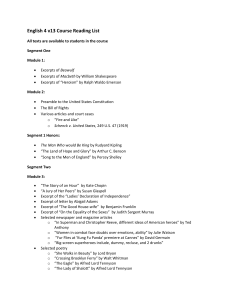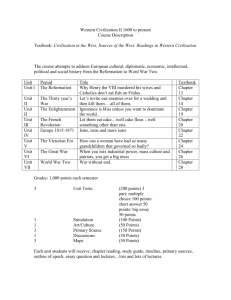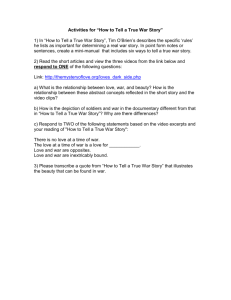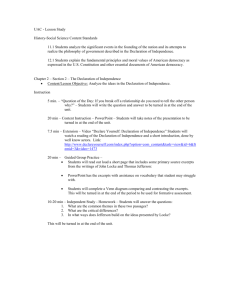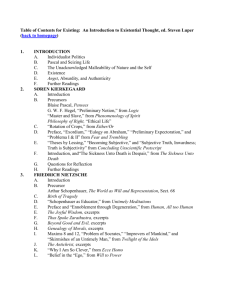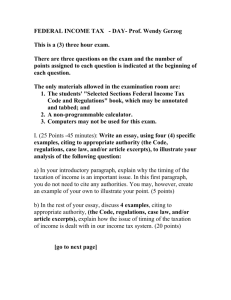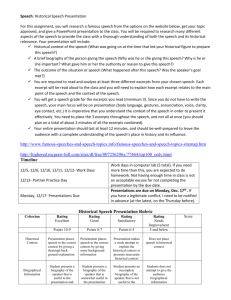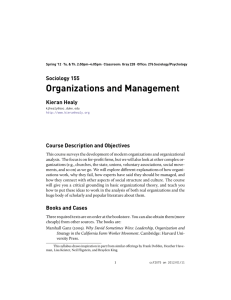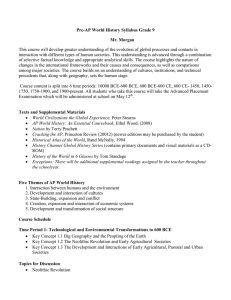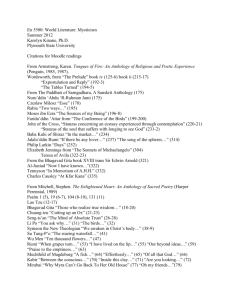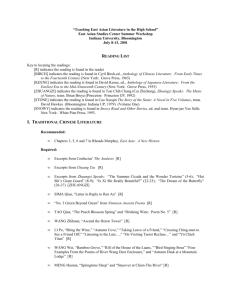GEA 3194 REGIONAL GEOGRAPHY: SOUTH ASIA
advertisement
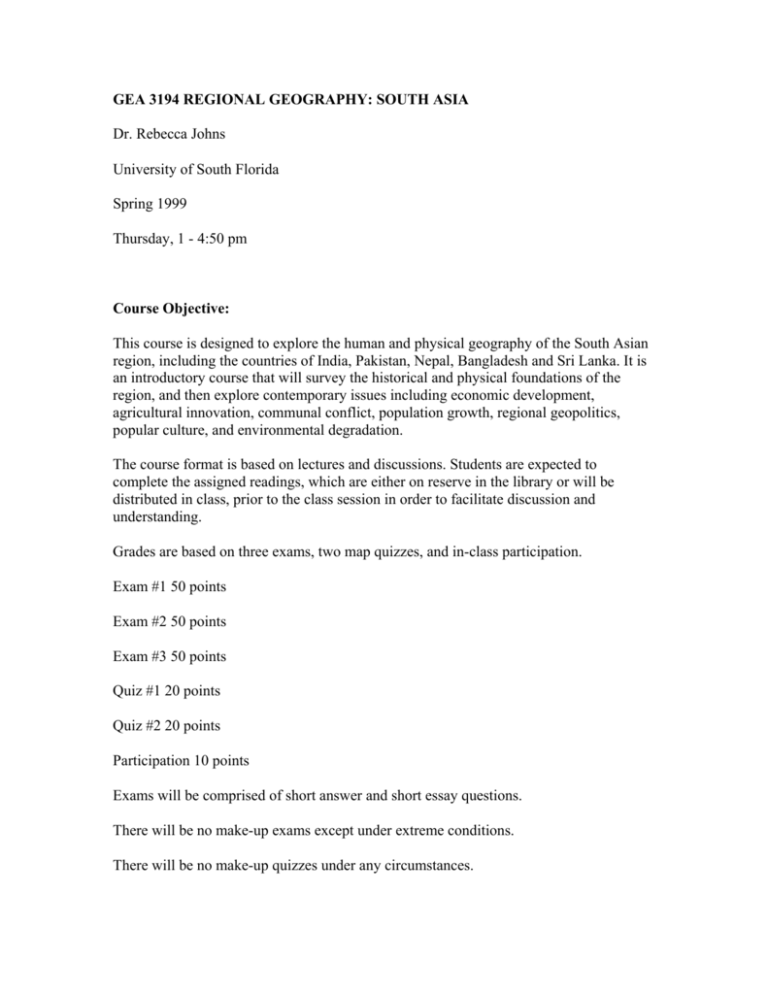
GEA 3194 REGIONAL GEOGRAPHY: SOUTH ASIA Dr. Rebecca Johns University of South Florida Spring 1999 Thursday, 1 - 4:50 pm Course Objective: This course is designed to explore the human and physical geography of the South Asian region, including the countries of India, Pakistan, Nepal, Bangladesh and Sri Lanka. It is an introductory course that will survey the historical and physical foundations of the region, and then explore contemporary issues including economic development, agricultural innovation, communal conflict, population growth, regional geopolitics, popular culture, and environmental degradation. The course format is based on lectures and discussions. Students are expected to complete the assigned readings, which are either on reserve in the library or will be distributed in class, prior to the class session in order to facilitate discussion and understanding. Grades are based on three exams, two map quizzes, and in-class participation. Exam #1 50 points Exam #2 50 points Exam #3 50 points Quiz #1 20 points Quiz #2 20 points Participation 10 points Exams will be comprised of short answer and short essay questions. There will be no make-up exams except under extreme conditions. There will be no make-up quizzes under any circumstances. Please become familiar with the classroom guidelines attached at the end of the syllabus, and with the university’s policies on academic honesty. Topics: (subject to change) January 7th: Physical Geography: Defining the Region January 14th: The People: Language, Religion & Everyday Life excerpts from the Mahabharata excerpts from The Cultural Atlas of South Asia "The Environments of South Asia", B.H. Farmer January 21st: Early History: from the Indus Civilization to the Mughal Empire "The Antecedents" and "The Impact of Aryan Culture" in Romila Thapar, A History of India Modern History: from the East India Company to Partition and Independence excerpts from The Cultural Atlas of India Map Quiz#1: Physical Geography January 28th: Population Distribution and Rates of Change; Development indicators Rakku’s Story February 4th: Exam #1 February 11th: Agricultural Production, the Green Revolution February 18th: Economic History: From the Planned Economy to Neo-liberalization The International Monetary Fundamentalism, Jeremy Seabrook India’s New Economic Policy, JS Uppal, Journal of Economic Development Feb. 25th and March 4th: Geopolitics: the Non-Aligned Movement; Kashmir; Sri-Lanka; the nuclear question India and Pakistan: collision or compromise? Foreign Policy Association Avoiding War in Kashmir, Sumit Ganguly, Foreign Affairs March 18th: Internal Politics of India: communalism and regionalism excerpts from Documenting Communal Violence excerpts from The Hindu excerpts from Beyond Darkness Khaki Shorts, Saffron Flags, Sarkar, Basu, Datta, Sen, Sarkar Politics of Indian Secularism, Upadhyaya video: Father, Son, and the Holy War Map Quiz #2: Political Map of South Asia March 25th: Exam #2 (AAG) April 1st and 8th: Forms of Resistance: the Gandhian tradition, women, tribals, Muslims and out-castes, workers excerpts from India’s Simmering Revolution The Enemy Within: India’s Separatist Movements, Vidhyadharan Films: "The Bandit Queen"/ "From the Burning Embers" April 15th: Environmental Issues "The Fight for the Forest", from This Fissured Land, R. Guha "Chipko: Social History of An Environmental Movement," from The Unquiet Woods, Ramachandra Guha "The Environmentalism of the Poor" in Varieties of Environmentalism April 22nd: Entertainment: Bollywood, Dance, Classical Music, Popular Writers clips from a Hindi Movie excerpts from Midnight’s Children April 29th: Final Exam Partial Reading List Colonization of the Indian Economy, 1757-1900, Irfan Habib Rakku’s Story, Sheila Zurbrigg, pages 19 - 41 Food Business, Multinationals and Labour, Gautum Mody India’s Democracy in Transition, Francine Frankel Religious vs. Regional Determinism, Graham Chapman Politics and Organized Labor in India, E.A. Ramaswamy India and Pakistan: collision or compromise? Foreign Policy Association Conflicting Strategic Interests of the United States and India: Evaluating US Arms Supply to Pakistan, M.J. Vinood, International Studies, 1992 "Avoiding War in Kashmir," Sumit Ganguly, Foreign Affairs "Chipko: Social History of An Environmental Movement," from The Unquiet Woods, Ramachandra Guha "The Fight for the Forest," from This Fissured Land, R. Guha Excerpts from The Hindu Globalization and the Indian Trade Union Movement Today, T.A. Francis "India’s New Economic Policy," JS Uppal, Journal of Economic Development Indian Women Forge Ahead, Jessie Bl Tellis-Nayak Beyond Darkness; Some Reflections on Communalism The International Monetary Fundamentalism, Jeremy Seabrook Masses, Classes and the State, Rajni Kothari The Enemy Within: India’s Separatist Movements, Vidhyadharan Khaki Shorts, Saffron Flags, Sarkar, Basu, Datta, Sen, Sarkar Politics of Indian Secularism, Upadhyaya Copyright © 2000 Project South Asia and Rebecca Johns. May be copied for educational purposes only. Commercial use is prohibited without permission of Rebecca Johns.

